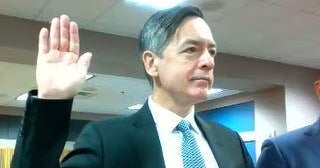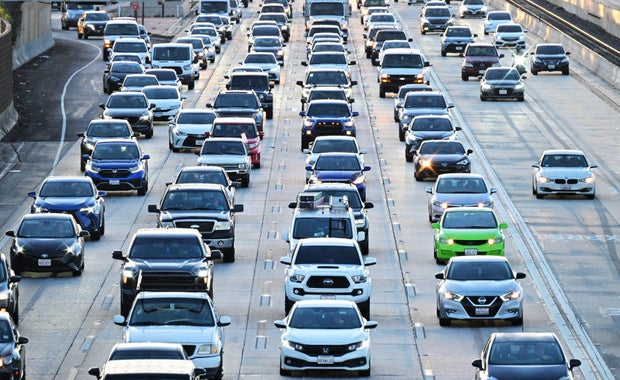CBS News
Supreme Court takes up case over California vehicle emissions standards

Washington — The Supreme Court on Friday said it will wade into a case over whether California can set its own vehicle emissions standards under a scheme laid out in the Clean Air Act.
The case involves a section of the law that preempts states from setting their own emissions standards for new vehicles. But the act exempts any state that had rules in place before March 1966, just after the law was amended to regulate automobile emissions, that are “at least as protective of public health and welfare” as the federal requirements.
California was the only state that regulated vehicle emissions before 1966, and therefore is the only state eligible for a waiver. In order to obtain a waiver, California must show that it needs its own emission standards “to meet compelling and extraordinary conditions.” The Clean Air Act also allows other states to adopt California’s vehicle emissions standards.
Since the Clean Air Act was enacted, the EPA has granted California more than 75 waivers for its vehicle emissions program. In 1993, the agency granted a waiver for the state’s zero emission vehicle standards. It did so again in 2019 for California’s first set of greenhouse-gas emissions standards.
In 2012, California put in place the Advanced Clean Car standards, which aimed to reduce emissions of greenhouse gases like carbon dioxide and other pollutants by increasing requirements for zero- and low-emission vehicle sales in the state for model years 2015 through 2025. The standards govern all new passenger cars, light-duty trucks and medium-duty vehicles.
FREDERIC J. BROWN/AFP via Getty Images
The EPA issued a waiver to California for those regulations in 2013, and car manufacturers started working to comply with the new emissions standards. But the agency revoked the waiver as to the zero-emissions and greenhouse gas requirements during the Trump administration in 2019. In 2022, under President Biden, it was reinstated again.
The EPA said at the time that California is “particularly impacted” by climate change, citing wildfires, heat waves, floods and droughts. These climate change impacts are “compelling and extraordinary conditions,” the standard for a waiver under the Clean Air Act, the agency said.
Several big automakers, including Volvo, Stellantis, Ford, Volkswagen, BMW and Honda, have all agreed to comply with California’s more stringent vehicle standards.
A group of 17 states, led by Ohio, and fuel companies asked the federal appeals court in Washington to review the EPA’s reinstatement of the 2013 waiver. The states argued the waiver provision in the Clean Air Act violates the Constitution by treating California differently from the other states, while the fuel producers said they are harmed by California’s requirements because they depress the demand for their product by requiring vehicle manufacturers to sell automobiles that use less or no liquid gas.
The U.S. Court of Appeals for the District of Columbia Circuit sided with the EPA in April. As to the states, the court found that Congress has been granted the authority to regulate interstate commerce, including vehicle emissions, and it was the legislative body that laid out the Clean Air Act’s preemption and waiver scheme. The three-judge panel also said the fuel producers did not have the legal right to sue.
“The nature and extent of equality between the states has been a central debate throughout our country’s history, from the founding to the admission of new states and beyond,” D.C. Circuit said in an unsigned opinion. “But state petitioners point us to no meaningful support for their novel request to apply the equal sovereignty principle as a categorical limit on Congress’s power to regulate interstate commerce.”
Both the companies and the states appealed to the Supreme Court, arguing the D.C. Circuit’s decision is incompatible with the Constitution because Congress doesn’t have the power to elevate a single state above the other 49.
The Supreme Court said Friday it would review only whether fuel producers can point to the waiver’s effect on automakers to show they have standing to sue. The justices declined to review whether the EPA’s waiver for California is unlawful.
California and the Biden administration urged the Supreme Court to turn down the case and uphold the Clean Air Act’s waiver provision.
The dispute is one of several to land before the Supreme Court in recent years involving the Clean Air Act and efforts to tackle air pollution.
In June, the Supreme Court blocked the agency’s so-called “good neighbor” plan, which aims to curb air pollution and address harmful smog. Two years earlier, in the summer of 2022, the high court found Congress didn’t grant the EPA the authority under the Clean Air Act to set emissions caps based on the generation-shifting approach taken through the Clean Power Plan rule.
But in cases that have arrived before the Supreme Court in an emergency posture, the justices have declined to intervene. In a trio of disputes, the high court temporarily allowed the EPA to continue enforcing more stringent standards on emissions from coal-fired power plants and new and existing oil and gas facilities.
CBS News
Meet the stars of “Dexter: Original Sin”

Watch CBS News
Be the first to know
Get browser notifications for breaking news, live events, and exclusive reporting.
CBS News
NFL legend Randy Moss reveals cancer diagnosis, surgery

MINNEAPOLIS — After announcing that he was stepping away from broadcasting earlier this month, NFL Hall of Fame wide receiver Randy Moss informed fans Friday that he has been diagnosed with cancer.
In an Instagram livestream Friday afternoon, Moss told fans worried about his health that he’s a “cancer survivor.” He disclosed that he spent six days in the hospital and underwent surgery. He thanked his team of doctors and all those who prayed for him.
“I am a cancer survivor,” Moss said. “Some trying times, but we made it through.”
Moss said doctors found cancer in the bile duct “right between the pancreas and the liver.”
“I didn’t think I would ever be in this position, as healthy as I thought I was,” he said.
Andy Clayton-King / AP
Moss, 47, stepped away from his broadcasting role at ESPN earlier this month, with the network citing a “personal health challenge” as the reason.
The Minnesota Vikings legend first revealed his health issues to fans on Instagram on Dec. 1, saying he “has been battling something internal” and asking for prayers.
Since then, Moss has received an outpouring of support from media colleagues, former players and the Vikings organization.
“I just want to, on behalf of the whole Minnesota Vikings organization, just send him our well wishes and support,” Vikings head coach Kevin O’Connell said. “We love Randy and know our fanbase feels the same way.”
Moss played 14 seasons in the league with the Vikings, New England Patriots, Oakland Raiders, Tennessee Titans and San Francisco 49ers and is fourth all-time in receiving yards (15,292) and second in receiving touchdowns (156). He retired in 2012, joined ESPN in 2016 and entered the Pro Football Hall of Fame in 2018.
CBS News
Georgia judge denies motion to overturn guilty plea from former Trump lawyer in election interference case

A Georgia judge has rejected former Trump campaign campaign lawyer Kenneth Chesebro’s push to invalidate his guilty plea in the Fulton County election interference case.
Chesebro was one of 19 defendants charged in the August 2023 indictment accusing former President Trump and others of trying to illegally overturn his 2020 election loss in Georgia.
Chesebro pleaded guilty in October 2023 to a conspiracy to file false documents charge. He was sentenced under Georgia’s First Offender Act, which allows the charge to drop off his record if he successfully completes probation with no violations.
Earlier this month, Chesebro’s attorney asked Fulton County Superior Court Judge Scott McAfee to throw out the plea after he dismissed the charge Chesebro pleaded guilty. His attorneys argued the plea should be thrown out because it violates his rights to due process.
But McAfee dismissed the motion calling it, “procedurally defective in more ways than one.” He noted that Chesebro “has already submitted a plea in response to this indictment — one of guilt.”
He also said that Chesebro’s motion was not a “valid motion in arrest of judgment” — Chesebro was calling on McAfee to stop the judgment because of a defect. McAfee pointed out that under the First Offender Act, Chesebro had pleaded guilty before “an adjudication of guilt” and “without entering a judgment of guilt.” So, McAfee reasoned in the ruling, “No final judgment occurs ….Therefore, there can be no arrest of judgment here.”
The indictment accused Chesbro of proposing, in a memo to Trump allies, “a bold, controversial strategy” to overturn the election: appoint alternate electors loyal to Trump in several states.
This proposal and at least one other memo he penned were included in the Georgia indictment as overt acts “in furtherance of the conspiracy.” The seven original counts against him stemmed from the plan to submit a slate of fake electors from Georgia.
The Fulton County election interference case against the president-elect is on hold after the Georgia Court of Appeals temporarily halted the proceedings in June. The appeals court is reviewing a trial judge’s ruling that allowed Fulton County District Attorney Fani Willis to continue prosecuting the case if special prosecutor Nathan Wade resigned. Trump and several of his co-defendants sought to remove Willis from the case after it was revealed she had a romantic relationship with Wade. Trump and others accused Willis of improperly benefiting from the relationship, an allegation she denies.




